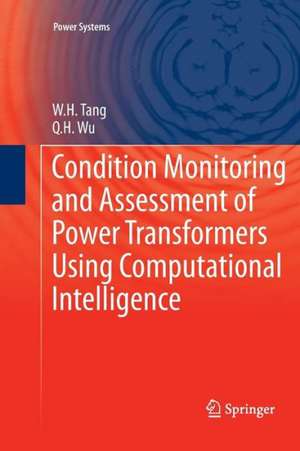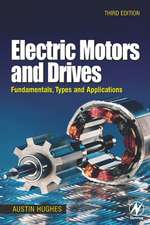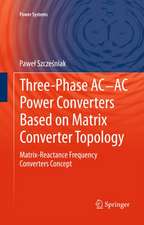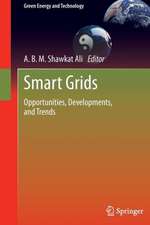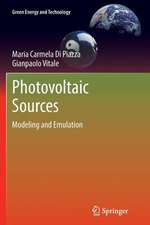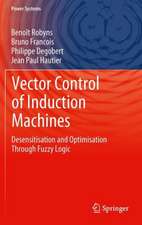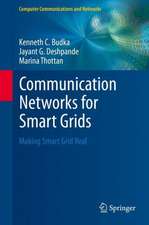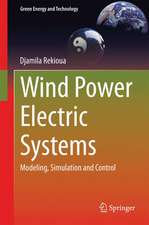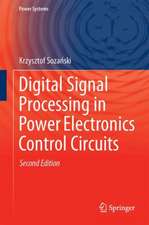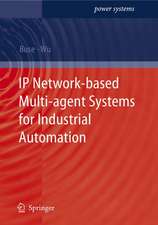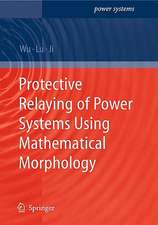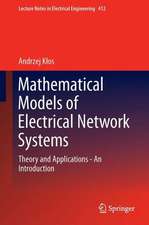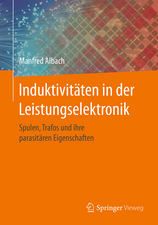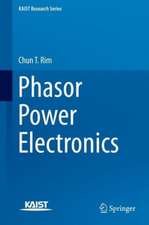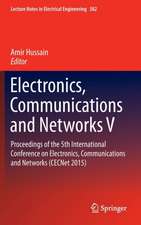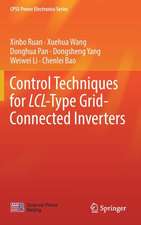Condition Monitoring and Assessment of Power Transformers Using Computational Intelligence: Power Systems
Autor W. H. Tang, Q.H. Wuen Limba Engleză Paperback – 25 feb 2013
| Toate formatele și edițiile | Preț | Express |
|---|---|---|
| Paperback (1) | 940.87 lei 6-8 săpt. | |
| SPRINGER LONDON – 25 feb 2013 | 940.87 lei 6-8 săpt. | |
| Hardback (1) | 946.87 lei 6-8 săpt. | |
| SPRINGER LONDON – 30 ian 2011 | 946.87 lei 6-8 săpt. |
Din seria Power Systems
- 18%
 Preț: 953.13 lei
Preț: 953.13 lei - 18%
 Preț: 783.98 lei
Preț: 783.98 lei - 20%
 Preț: 1002.48 lei
Preț: 1002.48 lei - 18%
 Preț: 1021.86 lei
Preț: 1021.86 lei - 18%
 Preț: 897.65 lei
Preț: 897.65 lei - 18%
 Preț: 788.72 lei
Preț: 788.72 lei - 18%
 Preț: 734.27 lei
Preț: 734.27 lei - 18%
 Preț: 902.36 lei
Preț: 902.36 lei -
 Preț: 563.51 lei
Preț: 563.51 lei - 18%
 Preț: 955.08 lei
Preț: 955.08 lei - 18%
 Preț: 946.87 lei
Preț: 946.87 lei - 18%
 Preț: 950.52 lei
Preț: 950.52 lei - 18%
 Preț: 949.23 lei
Preț: 949.23 lei - 15%
 Preț: 641.85 lei
Preț: 641.85 lei - 18%
 Preț: 1116.26 lei
Preț: 1116.26 lei - 18%
 Preț: 961.10 lei
Preț: 961.10 lei - 18%
 Preț: 1380.78 lei
Preț: 1380.78 lei - 15%
 Preț: 639.59 lei
Preț: 639.59 lei - 15%
 Preț: 641.03 lei
Preț: 641.03 lei - 18%
 Preț: 2497.51 lei
Preț: 2497.51 lei - 18%
 Preț: 957.62 lei
Preț: 957.62 lei - 18%
 Preț: 1229.91 lei
Preț: 1229.91 lei - 15%
 Preț: 643.34 lei
Preț: 643.34 lei - 18%
 Preț: 957.09 lei
Preț: 957.09 lei - 18%
 Preț: 1231.47 lei
Preț: 1231.47 lei - 15%
 Preț: 698.30 lei
Preț: 698.30 lei - 18%
 Preț: 953.20 lei
Preț: 953.20 lei - 15%
 Preț: 640.88 lei
Preț: 640.88 lei - 15%
 Preț: 634.18 lei
Preț: 634.18 lei - 18%
 Preț: 955.08 lei
Preț: 955.08 lei - 18%
 Preț: 1241.73 lei
Preț: 1241.73 lei - 18%
 Preț: 952.09 lei
Preț: 952.09 lei - 18%
 Preț: 946.55 lei
Preț: 946.55 lei - 18%
 Preț: 961.86 lei
Preț: 961.86 lei - 18%
 Preț: 944.19 lei
Preț: 944.19 lei - 18%
 Preț: 1110.72 lei
Preț: 1110.72 lei - 15%
 Preț: 642.03 lei
Preț: 642.03 lei - 15%
 Preț: 636.12 lei
Preț: 636.12 lei - 18%
 Preț: 1054.99 lei
Preț: 1054.99 lei - 15%
 Preț: 639.90 lei
Preț: 639.90 lei - 18%
 Preț: 957.32 lei
Preț: 957.32 lei - 18%
 Preț: 1235.57 lei
Preț: 1235.57 lei - 18%
 Preț: 959.19 lei
Preț: 959.19 lei
Preț: 940.87 lei
Preț vechi: 1147.41 lei
-18% Nou
Puncte Express: 1411
Preț estimativ în valută:
180.06€ • 195.52$ • 151.25£
180.06€ • 195.52$ • 151.25£
Carte tipărită la comandă
Livrare economică 22 aprilie-06 mai
Preluare comenzi: 021 569.72.76
Specificații
ISBN-13: 9781447126263
ISBN-10: 1447126262
Pagini: 220
Ilustrații: XVIII, 202 p.
Dimensiuni: 155 x 235 x 12 mm
Greutate: 0.31 kg
Ediția:2011
Editura: SPRINGER LONDON
Colecția Springer
Seria Power Systems
Locul publicării:London, United Kingdom
ISBN-10: 1447126262
Pagini: 220
Ilustrații: XVIII, 202 p.
Dimensiuni: 155 x 235 x 12 mm
Greutate: 0.31 kg
Ediția:2011
Editura: SPRINGER LONDON
Colecția Springer
Seria Power Systems
Locul publicării:London, United Kingdom
Public țintă
ResearchCuprins
1. Introduction.- 2. Evolutionary Computation.- 3. Methodologies Dealing With Uncertainty.- 4. Thermoelectric Analogy Thermal Models for Power Transformers.- 5. Thermal Model Parameter Identification and Verification Using Genetic Algorithm.- 6. Transformer Condition Assessment Using Dissolved Gas Analysis.- 7. Fault Classification for Dissolved Gas Analysis Using Genetic Programming.- 8. Dealing with Uncertainty for Dissolved Gas Analysis.- 9. Winding Frequency Response Analysis for Power Transformers.- 10. Winding Parameter Identification Using an Improved Particle Swarm Optimiser.- 11. Evidence-Based Winding Condition Assessment.
Notă biografică
Dr. W.H. Tang received his BEng and MSc(Eng) degrees in Electrical Engineering from Huazhong University of Science and Technology, China, in 1996 and 2000, respectively. He obtained a PhD from The University of Liverpool, Liverpool, UK, in 2004. From 2004 to 2006 he worked as a postdoctoral research associate and a university teacher in The University of Liverpool. Since 2006, he has held a lectureship in power engineering in the Department of Electrical Engineering and Electronics in The University of Liverpool. He has published 21 refereed journal papers and presented 24 international conference papers since 2000. His research interests include transformer modelling, substation condition monitoring, computational intelligence and multiple criteria decision analysis. He has also worked on multi-agent systems, renewable energy and power systems. His research has been funded by the Engineering Physical Science Research Council, UK, and industrial companies.Professor Q.H. Wu is the Chair of Electrical Engineering at The University of Liverpool, UK. He obtained an MSc(Eng) in Electrical Engineering from Huazhong University of Science and Technology (HUST), China, in 1981 and a PhD in Electrical Engineering from The Queen's University of Belfast (QUB) in 1987. Before joining The University of Liverpool in 1995, Professor Wu worked as senior research fellow, lecturer and senior lecturer at QUB and Loughborough University, UK, respectively. He has published 3 monographs, 150 journal papers, 20 book chapters and 180 refereed conference papers. In 1994 he was awarded the Donald Julius Groen Prize for the best paper published in the Journal of Systems and Control Engineering, Institution of Mechanical Engineers. He is a Chartered Engineer, Fellow of IET and Senior Member of IEEE. Professor Wu’s research interests include systems modelling and control, mathematical morphology, computationalintelligence, multi-agent systems and their applications for power system operation and control.
Textul de pe ultima copertă
In recent years, rapid changes and improvements have been witnessed in the field of transformer condition monitoring and assessment, especially with the advances in computational intelligence techniques. Condition Monitoring and Assessment of Power Transformers Using Computational Intelligence applies a broad range of computational intelligence techniques to deal with practical transformer operation problems. The approaches introduced are presented in a concise and flowing manner, tackling complex transformer modelling problems and uncertainties occurring in transformer fault diagnosis.Condition Monitoring and Assessment of Power Transformers Using Computational Intelligence covers both the fundamental theories and the most up-to-date research in this rapidly changing field. Many examples have been included that use real-world measurements and realistic operating scenarios of power transformers to fully illustrate the use of computational intelligence techniques for a variety of transformer modelling and fault diagnosis problems.Condition Monitoring and Assessment of Power Transformers Using Computational Intelligence is a useful book for professional engineers and postgraduate students. It also provides a firm foundation for advanced undergraduate students in power engineering.
Caracteristici
Provides a thorough background introduction for each analytical solution Includes links to toolboxes for the implementation of the methodologies introduced Allows readers to optimise the accuracy of their own modelling Includes supplementary material: sn.pub/extras
